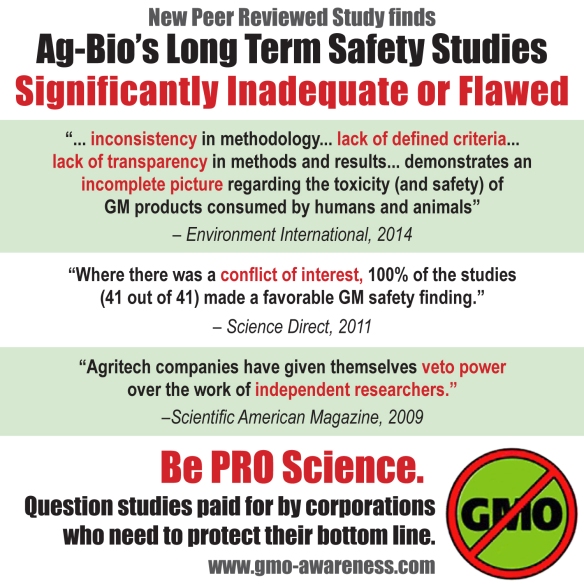BREAKING NEWS: a new peer reviewed study of the Ag-Biotech industry’s so called ‘long term safety studies’ has found them to be “significantly inaccurate or flawed” and lacking in proof of safety.
And these are just short-term animal feeding studies… because nearly two decades after genetic engineered ingredients have been present in the majority of processed foods found in your grocery store, NO long term human health studies have ever been performed.
Why is no research being done on the potential human health risks of GMOs? The ag-bio companies won’t let it happen.
Independent Research Stifled
Emily Waltz explained it back in 2009, in her article published in Nature Biotechnology: “the crop industry’s strong-arm tactics and close-fisted attitude to sharing seeds is holding back independent research and undermining public acceptance of transgenic crops.” (Read the full article here.)
Scientific American magazine agreed: “Agritech companies have given themselves veto power over the work of independent researchers.” Scientists must literally ask these corporations for permission before publishing independent research on genetically modified crops. (Source: Scientific American Magazine, August 13, 2009)
Not surprisingly, no such permission has been granted in the last twenty years, except for studies that are crafted to put GMOs in a positive context.
Two years later, the scientific journal Science Direct published a study in April 2011 in which they found significant conflict of interest in “research” done on the health risks and nutritional assessment of genetically modified products. “Where there was a conflict of interest, 100% of the studies (41 out of 41) made a favorable GM safety finding.”
The GMO Emperor Has No Clothes
Surely an untested food source would require extensive approvals from the FDA, right?One of the most common arguments from the biotech industry is that the FDA has “thoroughly evaluated” GM foods and found them safe.
This is untrue.
For nearly two decades, NO studies have been performed on the human safety of GMO products — in fact the first research is only now emerging, and almost all of it in countries outside of the U.S.
To date, no American scientist has investigated the levels of toxic residues in GMO foods.
There have been no studies to determine how much of the insecticide that crops are genetically engineered to produce remains inside the plant, once it reaches our dinner plate. (Did you know the EPA regulates and monitors this GMO corn as an insecticide?)
There have likewise been no studies to determine how much toxic residue is left over on crops which are heavily saturated with herbicides (weedkillers) during their growth. (As shown in the above graphic, the #1 genetically engineered trait is “Roundup Ready”: crops that can resist being repeatedly sprayed with Roundup).
This becomes even more sobering when you learn that the USDA has just approved crops genetically engineered to withstand 2,4-D—the key ingredient in Agent Orange used with such disastrous effects during the Viet Nam war—because weeds have evolved so much resistance to the use of Roundup.
No long-term testing has been performed to assess the impacts of any of these toxic substances — neither on human health nor on the environment.
And now we learn that what little testing that has been done (by the same corporations who manufacture GMO crops AND the weedkillers used with GMO crops) has been done with “significant flaws.”
Highlights of the new peer-reviewed study just published on Science Direct include:
- Histopathology studies on rats eating approved GM crops were reviewed.
- Only crops containing any of three widely-eaten GM genes were reviewed.
- Published studies could be found for only 19% of these crops.
- Most histopathology studies were published years after approval.
- All reviewed papers were found to be significantly inadequate or flawed.
ALL papers… significantly inadequate or flawed.
The review also discovered an inconsistency in methodology and a lack of defined criteria for outcomes that would be considered toxicologically or pathologically significant.
There was a lack of transparency in the methods and results, which made comparisons between the studies difficult.
Overall, they found the “evidence reviewed here demonstrates an incomplete picture regarding the toxicity (and safety) of GM products consumed by humans and animals.”
Their recommendation?
“Each GM product should be assessed on merit, with appropriate studies performed to indicate the level of safety associated with them. Detailed guidelines should be developed which will allow for the generation of comparable and reproducible studies. This will establish a foundation for evidence-based guidelines, to better determine if GM food is safe for human and animal consumption.”
We couldn’t agree more.
Read the complete synopsis here: http://www.sciencedirect.com/science/article/pii/S0160412014002669
STAY INFORMED:
Follow GMO Awareness for more news about #GMO, #organic food, #nutrition, #agriculture and the impacts on our #health and the #environment:
https://www.facebook.com/gmoawarenessusa
—
© GMO-Awareness.com 2011–2014. Unauthorized use and/or duplication of this material without express and written permission from this blog is strictly prohibited. Excerpts and links may be used, provided that full and clear credit is given to GMO-Awareness.com with appropriate and specific links back to the original content.




Pingback: Peer Review of GMO Safety Studies Finds Signifi...
Reblogged this on Dolphin.
thanks for putting together this detailed and informative list. i am totally appreciating you.
You are most welcome. 🙂
Reblogged this on Sherlockian's Blog.
Reblogged this on Lee's Stuff.